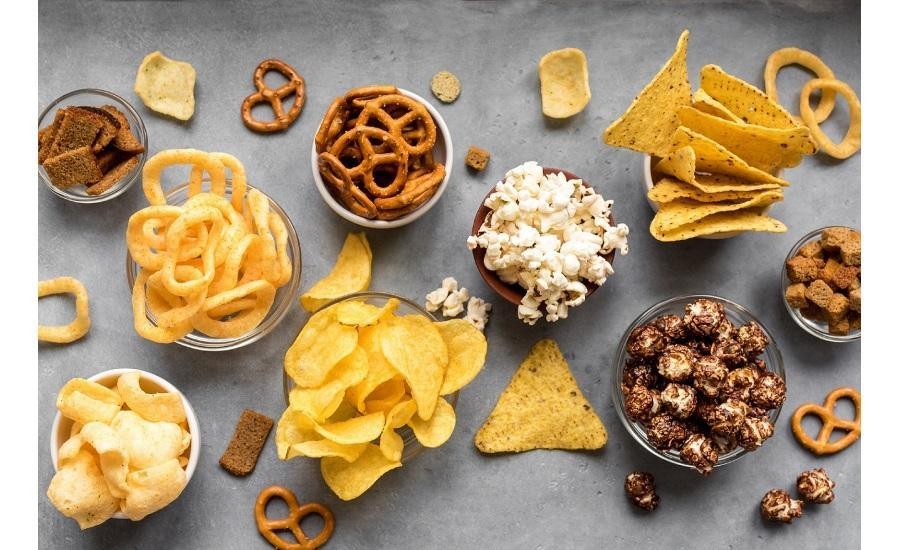After bariatric surgeries like Sleeve Gastrectomy, Gastric Bypass, or Duodenal Switch, dietary habits require a significant shift. Prioritizing health and making informed food choices become essential, especially focusing on protein, healthy fats, fruits, and vegetables due to limited food intake. One crucial aspect is understanding and avoiding “slider foods.”
Defining Slider Foods
Slider foods are typically characterized by being high in sugar, fat, and simple carbohydrates, while offering minimal nutritional value. Their name comes from the fact that they digest rapidly and “slide” through the stomach. The primary concern with slider foods is that individuals tend to consume larger portions without achieving a sense of satiety or fullness.
 Pile of various unhealthy slider foods like chips, crackers, and pretzels
Pile of various unhealthy slider foods like chips, crackers, and pretzels
Common Examples of Slider Foods Include:
- Chips
- Popcorn
- Crackers
- Pop chips
- Veggie straws
- Pretzels
- Candy
The Challenge of Avoiding Slider Foods
The ease with which slider foods can be overeaten poses a significant challenge, particularly for individuals who have undergone weight loss surgery. The absence of a strong feeling of restriction can lead to excessive consumption. It’s vital to view surgery as a tool to aid in reducing overeating, but some foods should be actively avoided.
Slider food consumption is often linked to activities such as watching TV, snacking out of boredom, continuous grazing, or emotional eating. A practical strategy is to minimize the availability of these foods by keeping them out of the home. The principle of “out of sight, out of mind” can be remarkably effective.
Inconsistent meal schedules or a lack of meal planning can also increase the likelihood of consuming slider foods. Dietitians often emphasize the importance of consistent eating patterns and avoiding skipped meals to help mitigate these cravings. Skipping meals can cause a drop in blood sugar, triggering cravings for quick energy sources like sugary or easily digestible foods like crackers and chips.
Consequences of Consuming Slider Foods
The ease of consuming large quantities of slider foods without feeling full can lead to a significant intake of calories from carbohydrates or sugar.
For instance, half of a medium-sized bag of potato chips can contain approximately 600 calories and 60 grams of carbohydrates. Regularly consuming such foods can contribute to weight gain. Furthermore, slider foods increase the risk of experiencing dumping syndrome.
Understanding Dumping Syndrome
Dumping syndrome occurs in individuals who have undergone bariatric surgery when they consume foods high in sugar and fat, or when they eat and drink simultaneously during meals. Symptoms may include diarrhea, nausea and vomiting, dizziness or lightheadedness, sleepiness, and bloating.
Avoiding slider foods, along with other high-sugar and high-fat foods, is crucial in reducing the likelihood of experiencing dumping syndrome.
Strategies for Avoiding Slider Foods
- Eat 3 High-Protein Meals Daily: Protein promotes satiety and helps stabilize blood sugar levels.
- Create a Consistent Eating Schedule: Regular meal times can help prevent hunger-driven snacking.
- Keep Slider Foods Out of the Home: Reduce temptation by limiting access.
- Have High-Protein Snacks Available: Opt for nutritious snacks to satisfy cravings.
- Reflect on Your Goals: Remind yourself of your health objectives to stay motivated.
- Exercise Regularly: Physical activity supports weight management and overall well-being. Consider walking, workout videos, swimming, or the gym.
- Consult with a Dietitian: Professional guidance can provide tailored strategies for managing cravings and making healthy choices.
Your journey toward a healthier lifestyle is a process with its challenges. Occasional setbacks or unhealthy choices should not undermine your overall progress. Approaching each day with a focus on learning and growth, rather than perfection, will help you develop sustainable healthy habits. Remember, consistency and mindful choices are key to long-term success.

